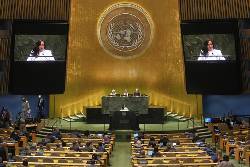UNITED NATIONS (AP) — Canada and Malta announced Wednesday they will recognize the state of Palestine in September, joining France and the United Kingdom in stepping up pressure to end the nearly 80-year Israeli-Palestinian conflict.
Canadian Prime Minister Mark Carney made the announcement after a Cabinet meeting. Christopher Cutajar, the permanent secretary at Malta’s Foreign Ministry, made his country's announcement earlier at the U.N. General Assembly’s meeting on a two-state solution to the conflict which was extended to a third day because of the high number of countries wanting to speak.
Cutajar said Malta has long supported self-determination for the Palestinian people, and “as responsible actors, we have a duty to work to translate the concept of a two-state solution from theory into practice.”
“It is for this reason that the government of Malta has taken the principled decision to formally recognize the state of Palestine at the upcoming U.N. General Assembly in September,” he said.
Carney said Canada will also make its announcement at the annual gathering of world leaders which starts Sept. 23. He said the intention is predicated on the Palestinian Authority “holding general elections in 2026 in which Hamas can play no part, and to demilitarize the Palestinian state.” Palestinian President Mahmoud Abbas made those promises in a June 10 letter and it's unclear what more Carney is seeking.
Malta says it wants a ‘lasting peace’ in Mideast
Malta’s Prime Minister Robert Abela earlier announced the decision by his country, a former British colony, to recognize a Palestinian state on Facebook, saying it is part of the nation’s efforts “for a lasting peace in the Middle East.”
The Mediterranean island nation and European Union member will join more than 145 countries, including over a dozen European nations, in recognizing the state of Palestine.
French President Emmanuel Macron announced ahead of this week’s meeting that his country will recognize the state of Palestine at the annual gathering of world leaders at the 193-member General Assembly which starts Sept. 23.
United Kingdom Prime Minister Keir Starmer announced Tuesday that Britain would recognize the state of Palestine before September’s meeting, but would refrain if Israel agrees to a ceasefire and long-term peace process in the next eight weeks.
France and Britain are the biggest Western powers and, with Canada, three members of the Group of Seven major industrialized nations have now made such a pledge.
Israel opposes a two-state solution and is boycotting the meeting along with its closest ally, the United States.
Israel’s U.N. ambassador, Danny Danon, on Tuesday sharply criticized about 125 countries participating in the conference and new recognitions of a Palestinian state, saying “there are those in the world who fight terrorists and extremist forces and then there are those who turn a blind eye to them or resort to appeasement.”
“While our hostages are languishing in Hamas terror tunnels in Gaza, these countries choose to engage in hollow statements instead of investing their efforts in their release,” Danon said. “This is hypocrisy and a waste of time that legitimizes terrorism and distances any chance of regional progress.”
Malta's Cutajar countered that "recognition is not merely symbolic – it is a concrete step towards the realization of a just and lasting peace.”
Quick action is urged
High-level representatives at the U.N. conference on Tuesday urged Israel to commit to a Palestinian state and gave “unwavering support” to a two-state solution, and they urged all countries that haven't recognized the state of Palestine to do so quickly.
The seven-page “New York Declaration” sets out a phased plan to end the Israel-Palestinian conflict and the ongoing war in Gaza. The plan would culminate with an independent, demilitarized Palestine living side by side peacefully with Israel, and their eventual integration into the wider Mideast region.
A separate one-page statement titled the “New York Call” approved late Tuesday by 15 Western nations says they have recognized, “expressed or express the willingness or the positive consideration ... to recognize the state of Palestine, as an essential step towards the two-state solution, and invite all countries that have not done so to join this call.”
It included six that have recognized the state of Palestine and nine, including Malta and Canada, that had not. The seven that still haven't are Andorra, Australia, Finland, Luxembourg, New Zealand, Portugal and San Marino.
Saudi Arabia's U.N. ambassador, Abdulaziz Alwasil, suspended the meeting “until further notice” after the 128th and final speaker, saying an outcome document has been sent to all 193 U.N. member nations. States have until the beginning of September to endorse the document.
...


 Copyright © 1996 - 2025 CoreComm Internet Services, Inc. All Rights Reserved. | View our
Copyright © 1996 - 2025 CoreComm Internet Services, Inc. All Rights Reserved. | View our